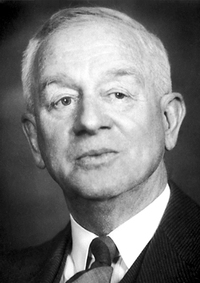Francis Peyton Rous Scientist
(Francis) Peyton Rous, FRS (October 5, 1879 – February 16, 1970) was born in Woodlawn, Maryland in 1879 and received his B.A. and M.D. from Johns Hopkins University. He was involved in the discovery of the role of viruses in the transmission of certain types of cancer. In 1966 he was awarded a Nobel Prize in Physiology or Medicine for his work.In 1911, as a pathologist he made his seminal observation, that a malignant tumor (specifically, a sarcoma) growing on a domestic chicken could be transferred to another fowl simply by exposing the healthy bird to a cell-free filtrate. This finding, that cancer could be transmitted by a virus (now known as the Rous sarcoma virus, a retrovirus), was widely discredited by most of the field's experts at that time. Since he was a relative newcomer, it was several years before anyone even tried to replicate his prescient results. Although clearly some influential researchers were impressed enough to nominate him to the Nobel Committee as early as 1926 (and in many subsequent years, until he finally received the award, 40 years later—this may be a record for the time between a discovery and a Nobel Prize).In his later life he wrote biographies of Simon Flexner and Karl Landsteiner. His wife Marion died in 1985.
